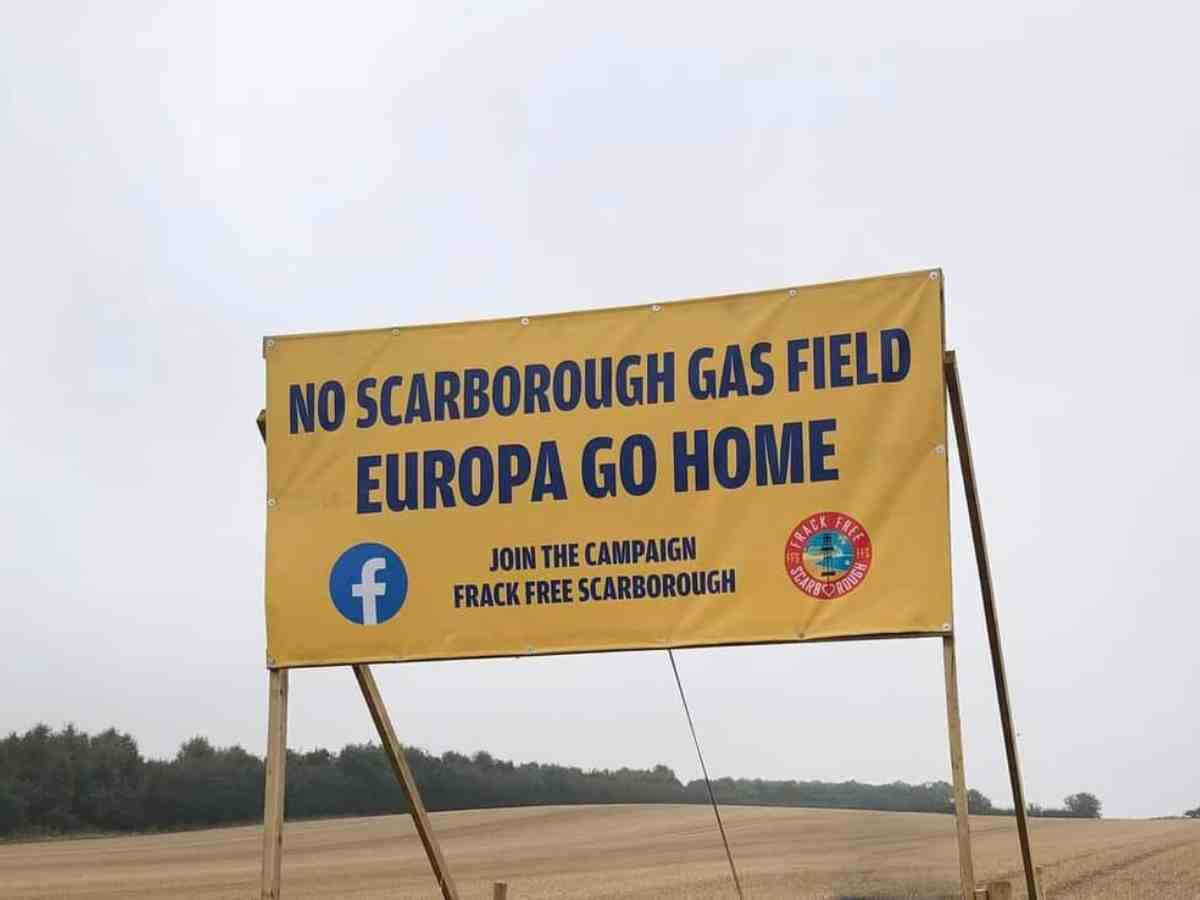Fossil fuel company Europa Oil & Gas is seeking permission for a fracking project in North Yorkshire. And thanks to a gaping loophole in the current moratorium on the environmentally destructive process, it just might happen.
Yet, if the fact the fracking may go ahead in itself weren’t bad enough, the proposed project has exposed something else concerning about current regulations. In particular it has underscored how some new fossil fuel projects may also evade a landmark recent ruling on downstream emissions.
Predictably, Europa has pulled out all the stops in its efforts to do just that – and kicked its PR machine into action over the planned frack.
A new fracking project and the Horse Hill judgement
In June, the Supreme Court delivered a devastating blow to the fossil fuel industry. This was the historic case against UK Oil and Gas’s (UKOG) Horse Hill site. It was brought by Extinction Rebellion campaigner and former Surrey resident Sarah Finch, on behalf of the Weald Action Group.
Crucially, the groundbreaking judgement ruled that greenhouse gas emissions produced from consumers combusting the oil and gas:
are entirely within their control
In other words, companies could choose not to extract them in the first place.
Now, fossil fuel firms will have to consider these downstream emissions and their possible impact in their EIAs.
However, it’s important to note that this doesn’t automatically mean a blanket ban on fossil fuel projects. It simply requires firms to include these in their EIA – and for planning authorities to take this into account when deliberating over approval for an application.
Nevertheless, the landmark ruling will bring the climate impacts of combusting fossil fuels into the mix. In theory, this will make it harder for fossil fuel projects to get planning consents, in the context of the UK Climate Change Act and the country’s binding international commitments.
As the Canary previously reported, fossil fuel firm Egdon has now submitted a pre-application on behalf of Europa Oil & Gas to frack for gas near Scarborough. And crucially, a spokesperson from Frack Free Scarborough highlighted to the Canary that the fracking project at Burniston was a case and point of how the fossil fuel industry might try to get around the recent judgement in some projects anyway.
Trying to evade the EIA
In Burniston’s case, Egdon and Europa had said an EIA would be unnecessary. They’d argued that the exploration drilling:
is not likely to have significant environmental effects by virtue of its characteristics, based on the relatively short duration of the drilling operations
As it happens, this is exactly the get-out clause UK’s EIA regulations afford. Notably, both the absence of “significant environmental effects” and the project occurring over a “short period” can rule out the requirement for an EIA.
Indeed, there have been cases where councils have screened out fossil fuel projects for EIAs. Particularly notable, in 2014, Cheshire West and Chester Council didn’t ask for EIAs when granting consent for the fracking project at Upton – famously the site of the longest-running anti-fracking camp.
Why is this important in the context of the judgement on Horse Hill? Put simply, because the ruling only applies to projects with EIAs. This is the case since the EIA is where companies have to set out and consider the effects of their downstream emissions. In other words, it means some onshore fossil fuel projects can – and potentially will – evade the moratorium.
Fracking project could have ‘significant environmental impacts’
Ultimately however, North Yorkshire Council disagreed with the fossil fuel companies assessment. It concluded on the basis of the company’s pre-application that the project:
could have significant environmental impacts
In particular, it emphasised these:
in relation to landscape and transport
It means that Egdon and Europa will have to submit an EIA – and include the impacts of its downstream emissions in it.
Initially, Europa applied for a dispensation on this from the government. Essentially, this is where the government could overrule the council’s decision. However, strong local opposition appears to have put paid to this ploy.
Frack Free Scarborough’s spokesperson recounted to the Canary how over 150 local people and councillors at a Burniston local meeting unanimously voted that the company should produce an EIA. Obviously, this wasn’t binding, but this and local campaigners continued vocal protests against the project seems to have given the company pause for thought.
It has now said it will disregard a dispensation if the government grants it. Of course, its agenda is apparent. This is the company’s ‘good will gesture’ – in actuality, a manoeuvre to get the community – and by extension, the council, on-board with the project.
Europa’s community charm offensive
And throughout, Europa has indeed been playing a charm offensive with the local community.
One part of this has been its online feedback consultation form. Unsurprisingly, it’s rammed with leading questions that yield foregone conclusions. One particular question frames its narrow multiple choice answers with the claim that:
imported gas results in emissions over 20 times greater than domestic production
However, this is an entirely bogus figure. For one, it’s unclear where Europa got this from. It appears as if the company has plucked it from thin air. Of course, it’s a common industry line that UK domestic production is cleaner in terms of emissions than imported liquified natural gas (LNG). However, the claim is persistently overblown.
In reality, the UK imports the vast bulk of its LNG from Norway, and the government’s own data has shown this is less polluting than gas produced from the UK’s North Sea. It also entirely misses the point that just because Europa would be producing the gas here, it doesn’t mean it will stay here.
In reality, the gas will most likely go to the highest bidder on the regional gas markets. In fact, it admitted in its engagement with the community that it couldn’t guarantee the gas it produces wouldn’t be for export.
So, this also eviscerates one of its other key arguments for the project. This is the idea that the fracked gas is to meet UK energy demand, and bring down bills – which is patently false. It has splashed this across a series of slick online community information material.
Naturally, there’s plenty more industry hot air where these came from too. Largely, it’s all to pitch itself as the friendly neighbourhood fracking company.
Obviously, the ‘consultation’ is just a tick-box exercise when it comes down to it. It will enable the company to claim it has engaged with the community and taken their opinions on board.
The fossil fuel company ‘schmooze zone’
Unfortunately for Europa, this isn’t going to fly. Frack Free Scarborough’s spokesperson articulated how campaigners fighting the project are not falling for its PR:
There’s an inherent contradiction at the heart of fossil fuel exploration and that is that the fossil fuel companies have one responsibility — to make money for their shareholders. They can talk about all sorts of other stuff but when it comes down to it that’s what they’re there for. We, as residents and community members, also have one responsibility – to take care of our families, and our communities, and extended outwards from that, to take care of the planet.
Those two sets of interests do not mix and that means that the fossil fuel industry isn’t welcome anywhere. It has to force itself on the communities it wants to operate within. Obviously, tactics vary depending on the political context. From murder in the Niger Delta to obfuscation, a campaign of lies and disinformation, and downright bribery.
In the middle of that spectrum from carrot to stick is the schmooze zone, and this is where the onshore UK drilling industry prefers to operate. This is where they talk about energy security, as Europa has, gas prices, which Europa has, about the pathway to net zero. All of this kind of stuff, including even more insidious and sneaky stuff.
Predictably then, Europa has done a good job of dressing up their fracking operation. From “small-scale standard oilfield operation” to “conventional hydraulic fracturing”, the company has gone to every effort to downplay the fact it plans to frack in Yorkshire.
Similarly, Frack Free Scarborough’s spokesperson also highlighted how the industry’s terminology has helped it bypass the moratorium and pitch itself as a safer fossil fuel process:
That term ‘proppant squeeze’ is part of the schmooze effort – it sounds very friendly, doesn’t it?
Merchant of misinformation
Unsurprisingly, at a community drop-in session, the merchant of doubt kicked this misinformation machine into full gear.
Again, Europa took umbrage at the use of the term ‘fracking’. A member of the local community took notes on the meeting. Frack Free Scarborough shared them with the Canary. According to these, the company’s CEO Will Holland, and COO Alastair Stuart expressed their frustration over this.
In particular, they suggested the project shouldn’t be equated with so-called high volume fracking. In another ostensible schmooze-fest then, they purportedly opined how they wished people would use:
less contentious language around ‘well stimulation’.
Fortunately, independent onshore oil and gas monitoring site Drill or Drop’s Ruth Hayhurst has held the company’s feet to the fire over its claims during the meeting.
In particular, it disclosed how it would use 1,200 cubic metres (m3) of fluid in total, across up to three so-called “proppant squeezes”. A single frack would use up to 500m3. And crucially, as part of its presentation, it compared these to other high-profile former fracking sites in the UK.
However, it was here that Hayhurst caught the company out. Europa’s exhibition panel showed vastly higher amounts than operators at these sites actually used in practice. She pointed out that Preston New Road’s individual fracks used between 2.5m3 to 472m3. In other words, the largest frack used a similar volume to the amount Europa could use in its exploration at Burniston.
Of course, this is another sticking point with the moratorium too. Notably, it was the earthquakes at Preston New Road that ultimately formed the basis for it.
According to Hayhurst, the company argued that Preston New Road earthquakes were due to the existence of geological faults. But, it said that none had been identified at Burniston.
Once more though, there was a significant problem with this. Hayhurst highlighted that Europa hasn’t conducted 3D seismic surveys yet – meaning, it doesn’t properly have the full picture of geological faults at Burniston. Worse still, it won’t do this until next year – that is, after it has submitted its application.
More obfuscation
On top of this, Europa’s leaflet again leans into the fact it’s a lower volume, lower pressure form of fracking. It says that:
There will be no earthquakes as a result of this operation. Despite there being no risk we will still monitor seismic activity at the site and the operation will be immediately shut down if any unusual seismic activity is noted as a result.
Of course, again, this is patently false. Europa can’t conclusively rule out the possibility that its operation could trigger seismic activity. Realistically, it can at best say that it’s unlikely. This is what an assessment at Wressle determined before Europa venture partner Egdon carried out its frack in 2021.
So, Europa compared the Burniston proposal to the proppant squeeze operation at Wressle further. On this, Hayhurst noted:
proppant squeeze used 146m3, just over a quarter of the fluid volume that could be used in a single operation at Burniston.
Obviously, the point here is that Wressle was a smaller operation and therefore not necessarily a good comparison. The chances of inducing an earthquake may very well be small. However, Europa’s misinformation deliberately tries to obfuscate that it’s even a possibility.
EIA downstream emissions evasion is just the start
At the end of the day, no amount of Europa’s sly public relations pitch is going to change the reality. And that is to tackle the climate crisis, there should be no new fossil fuel projects. The EIA downstream emissions is one significant nail in the coffin of this planet-wrecking industry. But evidently, fossil fuel companies will continue to do everything in their enormously well-resourced power to weasel out of it.
The fact a fracking project nearly did shows that these profiteering polluters have every intention of maintaining business-as-usual. And they’ll do so whatever the cost is to communities, and the planet at large. However, climate activists and local people will be damned if they let them get away with it.
Featured image supplied




